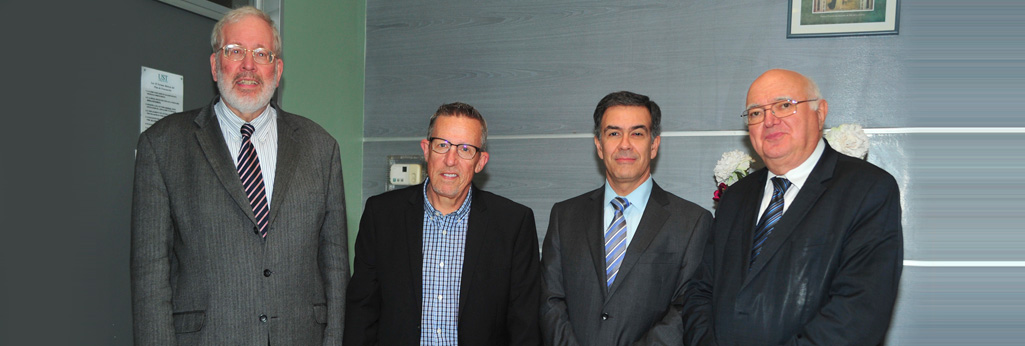Seminar on Faith and Science closes with interesting conclusions

National and international experts participated of this meeting which arose from the interest of ICUSTA worldwide network of universities in implementing the existing relationships between both modes of thinking, in undergraduate studies.
Universidad Santo Tomás of Chile held this Faith and Science Seminar on 5 and 6 May, 2016, which brought together leading national and international lecturers.
The meeting was held in the context of the interest of the worldwide network of universities inspired by the spirit of St. Thomas Aquinas, ICUSTA and the AIRES initiative, to reflect on how to implement a reflection regarding the relationships existing between both lines of thinking in undergraduate studies.
During the inauguration, UST President, Jaime Vatter, stressed how proud the institution is “to be able to collaborate with the task of finding a way to foster discussion in the classrooms about the relationship between faith and science”. Such debate is currently taking place in different parts of the world.
At the same time, Carlos Casanova, Seminar coordinator and Professor at the Center for Thomistic Studies of UST, emphasized the urgent need to discuss the dominant positivistic view often held by contemporary universities, according to which there would be a radical opposition between science and religion.
“Since 1917 (the latest) the Church has clarified that God is the Creator of Heaven and Earth, but that He could have used many different second or created causalities. Faith does not exclude the theory of evolution, provided it is formulated within its own field, which is that of Paleontology, and does not seek to invade the field of Theology”, he explained.
Experts and their relationship with Faith and Science
The meeting involved the active participation of philosophers and scientists who, from their different experience and training, discussed how both perspectives are related.
The first day opened with researcher Philippe Quentin’s presentation. He’s an academic at the Bordeaux Gradignan Center for Nuclear Studies. In his presentation, he put forward the idea of Natural Sciences as an opportunity, rather than an obstacle, to Christian faith.
As he claimed, the root of this alleged confrontation is a “philosophical attitude that considers science as the only truth.” However, he explains, scientists do not have all the answers and their task is to “guess” and to move toward the unknown and, in this sense, “science is a genuine passage to God.”
The following lecturer, Rafael Vicuña, Member of the Pontifical Council for Culture, referred to the epistemological confusion as the main cause of the alleged conflict between science and religion.
In his view, science is an invitation to try to go further, but not resorting to the scientific method, but rather through “philosophical reflection”, to approach the “meaning” of natural processes and their transcendence. Scientists need an adequate epistemological training so as to avoid unduly extrapolations in their conclusions.
The first day of lectures closed with the presentation of the Doctor and Professor of Biology, Don Frohlich, an academic at the University of Saint Thomas in Houston, who referred to neo-Darwinism and its compatibility with Catholic thought.
Here he stated that the discussion also has to do with education, thus highlighted the initiatives that are taking place in the US, and in other places in the world as part of undergraduate education, with the aim of introducing proper consideration of the relationship between Faith and Science, and to formulate general curricula as well.
William Carroll, an academic at Oxford University’s Faculty of Theology, one of the great Catholic advocates of evolution, opened the second day of the seminar and emphasized the importance of recognizing that there is no science without philosophical assumptions. “This is the starting point to help scientists to see they need a greater philosophical outlook”.
The meeting closed with the presentation given by Alejandro Serani, a member of the Pontifical Academy for Life, founder of the Universidad Católica de Chile Bioethics Center, and Carlos Casanova of UST Chile who presented the history of the rise of science in Greece and its practice and development in the Western World, in order to show the falsehood of the idea that there is a necessary enmity between religion or the Church, on the one hand, and science, on the other.
“For example the Franciscans rendered a great service to science in defending the divine omnipotence before the Averroist dogma of the oneness of the world.”
Seminar Faith and Science Conclusions
At the end of the day, its organizer, Carlos Casanova, claimed that this was a very enriching experience. After the debate and the work-groups, it was possible to conclude that the intelligible structure of the world, as presented to the mind of the scientist, requires a Legislating Mind, that of God. And that scientists need an adequate epistemological training to avoid extrapolating their conclusions improperly.
“Hawking and others’ criticism of creation are unaware that the theological concept of creation does not imply that time is finite or that God has used it as a kind of ‘material’ for His action nothingness. When it is said that God creates out of nothing, we are not talking about the condition of matter before the Big Bang. It is being proposed, instead, that God causes being without using any matter. It is not a natural change done without matter, because the Greeks already perceived that this is impossible. Creation is not a natural change”, explained Casanova.
Chilean faculty members Alejandro Serani, founder of the UC Bioethics Center and its current Director of Research, and Carlos Casanova, UST, pledged to make a proposal for two courses of epistemology that would allow Science students from the UST and UC, to better understand the relations between Faith and Science.